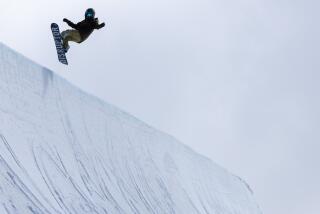SCIENCE / MEDICINE : Medical Journal Saves the Bizarre, Zany Stories for Year’s End
- Share via
Men who are uncircumcised should exhibit great care in running or skiing during cold weather because of the increased risk of frostbite, according to a new report in the British Medical Journal.
In another study, psychiatrist Linda R. Montague of Glanrhyd Hospital in Mid Glamorgan submitted a short report on the “cross-species applicability of psychiatric diagnosis and treatment.” The patient was a female cat--tortoise-shell and white--whose identity, in the best medical tradition, was carefully kept confidential.
The studies are part of the annual year-end issue of the British Medical Journal, in which the editors save up their most unusual, bizarre or simply humorous short medical reports--all of them true. The results provide a somewhat unusual view of British medicine.
Medical officers Simon Travis and Digby Roberts of the 45 Commando Group of the Royal Marines reported on seven young soldiers who suffered “Arctic Willy,” mildly frostbitten genitalia, while running or skiing in January and February at a base 132 miles north of the Arctic Circle in Norway.
All of the men wore relatively tight-fitting pants that allowed wind to blow through them. Six of the seven were uncircumcised.
Normal treatment for frostbitten extremities is immersion in a bowl of warm water, the physicians said, “but this would clearly be impracticable in these circumstances.” They recommended a hot shower or sauna as an alternative. None received permanent injury, but the physicians advised them that “prevention by loose-fitting windproof trousers is the key.”
In Montague’s research, the cat was discovered in conditions of squalor after the death of its 89-year-old owner. A veterinarian successfully cured an ear infection, but noted that the cat was withdrawn and self-neglecting, did not groom itself, and spent most of its time hiding in a utility room, presumably as a result of neglect before the owner’s death and the trauma of the death.
“The doctor thought that senile dementia was the likely diagnosis and that euthanasia was the only humane option,” Montague wrote.
Montague took the cat into her care and initiated a program of intensive stroking and holding, brushing to encourage washing behavior, “occupational therapy with a catnip mouse and a length of string, and a regular toileting program.”
The cat recovered fully, assumed a dominant position among other cats in the household, and even “showed herself capable of learning new skills by mastering the use of the cat-flap,” Montague said. The results of the treatment prove, she concluded, that “principles of rehabilitative therapy are applicable beyond the human species.”
Neuroradiologist P. Macpherson of Southern General Hospital in Glasgow examined a woman who complained of sciatica, a piercing pain in the region of the hip and thigh. A medical history showed that she had been treated 18 months before when she fell on and broke a glass-topped coffee table.
X-rays showed that the woman had a piece of glass lodged near the bottom of her spine. Macpherson’s conclusion: The woman had a “pane in the back.”
Printed warnings that people with coronary problems should not ride roller coasters in amusement parks should be taken to heart, according to a group from the Royal Infirmary in Glasgow. The group attached portable electrocardiographs to seven women and six men before they went on a twisting roller-coaster ride.
The subjects’ heart rates increased from an average of 70 beats per minute before boarding the ride to an average of 154 beats per minute during it, and didn’t return to normal until an average of 10 minutes after the ride was over. Heart rates of five reached more than 90% of their theoretical maximum.
Other reports dealt with a rare incident in which two brothers independently suffered injuries during warm-ups for the same cricket match and a case of Salmonella infection caused by immoderate consumption of eggnog, in which the eggs are not cooked.
Finally, T.P. Eddy, a former colonial medical service officer, was moved to write by earlier reports dealing with numbness in the limbs of leprosy patients. He recalled his own experience in a West African leprosy colony.
After examining the patients, he asked if there was anything he could get them. One young man, a spokesman for the group, asked for “a boosy cat.”
“‘Have you got mice?,’ I asked.
“‘No, sir, rats,’ he replied.
“‘Are they eating your food?’
“‘No, sir, us.’
“Then they showed me the linear, parallel tooth marks of rats on the atrophied stumps of their arms and legs.”
They got their cat.





